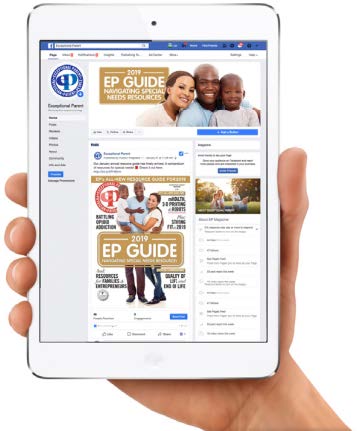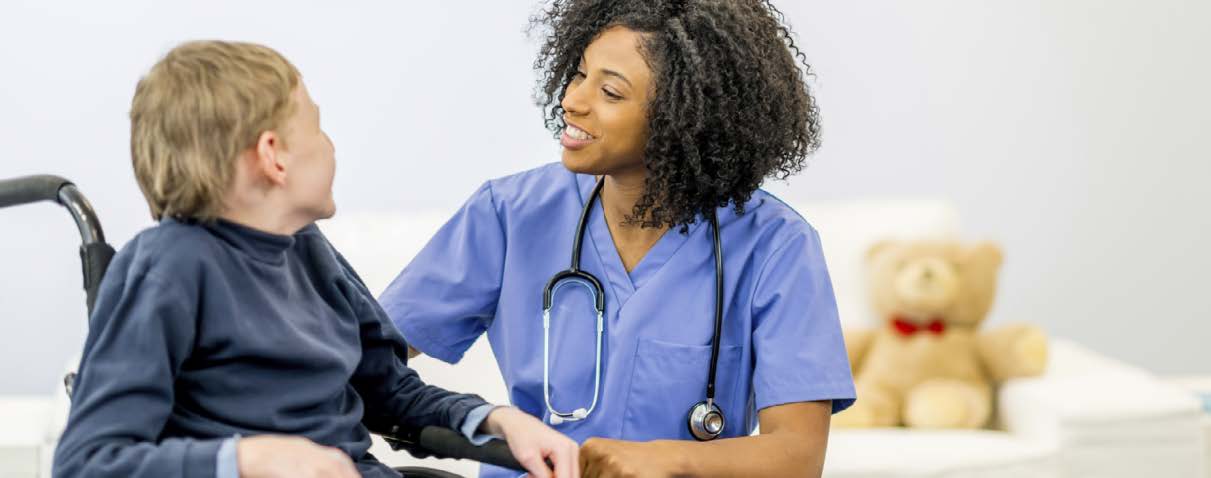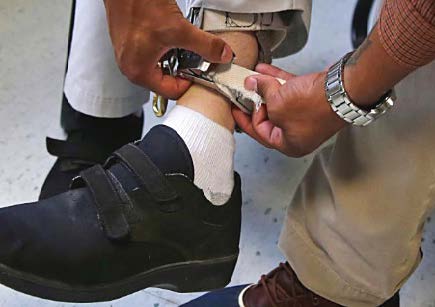WHAT'S HAPPENING
CONNECT AND DISCOVER
Join EP's Facebook Community

EP's revamped Facebook page welcomes you to share stories, discover resources and connect with the special needs community. Parents and families with members with special needs benefit greatly from meaningful interaction with peers facing the same challenges and joys. Facebook has provided the EP readership community with a convenient and effective platform to communicate, ask questions, promote events and share special moments.
Connect, Share and Discover with EP facebook.com/exceptionalparentmag
Visitors can access the latest news and articles from recent issues of EP Magazine, and provide feedback and insight of their own. EP's Facebook page an open community group for parents, grandparents, family and friends of people with special needs family members. It's an ideal place for both parents and professionals to share information and resources.
Parents, teachers, academics and professionals that are willing to help each other by sharing knowledge and resources are a vital part of the EP community. Like us today!
ACT NOW TO URGE CONGRESS TO SUPPORT BIPARTISAN DIRECT SUPPORT PROFESSIONALS BILL

Take action now and show your support by visiting disabilityad- vocacynetwork.org/thearc/app/onestep-write-a-letter?0&engagementId=506643.
Direct support professionals (DSPs) assist people with disabilities to live independently by providing support with daily living needs like dressing, food shopping, job coaching, transportation, and more. The work DSPs do is vital to making sure that people with disabilities can lead full lives in their communities.
However, But DSPs are underpaid, and the value of this professional work is not always recognized. This leads to high turnover and job vacancies. It's a crisis. DSPs and people with disabilities deserve more!
Ask your Members of Congress to support S. 3369/H.R. 6045, the Recognizing the Role of Direct Support Professionals Act, a bipartisan bill by visiting disabilityadvocacynetwork.org/thearc/app/onestep-write-a-letter?0&engagementId=506643. This bill will professionalize what it means to be a DSP and improve data collection around DSP workforce challenges. This is an important step in solving this crisis. Right now, the federal government classifies DSPs under the larger category of "home health care aide." This makes it impossible to track and understand the workforce trends for DSPs and to see what regions and support needs are being hit hardest by the crisis. This new bill would create a separate classification for DSPs, which will lead to better data collection. Accurate data will give the government the information it needs to:
- • fully understand DSP turnover rates,
- • identify where the workforce shortages are,
- • understand where training programs are needed,
- • recognize the important role that DSPs play in supporting people with disabilities, and
- • ensure DSPs get paid a living wage.
FDA TAKES RARE STEP TO BAN ELECTRICAL STIMULATION DEVICES FOR SELF-INJURIOUS OR AGGRESSIVE BEHAVIOR
After careful consideration, the U.S. Food and Drug Administration, in early March, published a final rule to ban electrical stimulation devices (ESDs) used for self-injurious or aggressive behavior because they present an unreasonable and substantial risk of illness or injury that cannot be corrected or eliminated through new or updated device labeling.

NOT SHOCKING: A therapist checks the ankle strap of an electrical shocking device on a student at a school in Canton, Massachusetts. The FDA announced a ban on such devices on March 5th.
"Since ESDs were first marketed more than 20 years ago, we have gained a better understanding of the danger these devices present to public health," said William Maisel, M.D., M.P.H., director of the Office of Product Evaluation and Quality in the FDA's Center for Devices and Radiological Health. "Through advancements in medical science, there are now more treatment options available to reduce or stop self-injurious or aggressive behavior, thus avoiding the substantial risk ESDs present."
ESDs administer electrical shocks through electrodes attached to the skin of individuals to immediately interrupt self-injurious or aggressive behavior or attempt to condition the individuals to stop engaging in such behavior. Evidence indicates a number of significant psychological and physical risks are associated with the use of these devices, including worsening of underlying symptoms, depression, anxiety, post-traumatic stress disorder, pain, burns and tissue damage.
In addition, many people who are exposed to these devices have intellectual or developmental disabilities that make it difficult to communicate their pain. Evidence of the device's effectiveness is weak and evidence supporting the benefit-risk profiles of alternatives is strong. As the risks presented by ESDs meet the agency's definition of unreasonable and substantial and cannot be corrected or eliminated through new or updated labeling, banning the product is necessary to protect public health.
The act of banning a device is rare and the circumstances under which the agency can take this action is stringent, but the FDA has the authority to take this action when necessary to protect the health of the public. The FDA has only banned two other medical devices since gaining the authority to do so.
This final rule issued follows a 2016 proposed rule to ban ESDs from the marketplace and takes effect 30 days after publication in the Federal Register. The FDA understands that a gradual transition period may be needed for a subgroup of individuals currently exposed to these devices, to allow time for them to transition to another treatment, so the agency is establishing two compliance dates. For devices in use on specific individuals as of the date of publication and subject to a physician-directed transition plan, compliance is required 180 days after publication of the final rule in the Federal Register. For all other devices, compliance is required 30 days after publication of the final rule in the Federal Register.
The final rule bears minor changes from the proposed rule, including clarification of which devices are banned and an explanation that this ban is not a special control that allows continued use of the device. A full list of changes is available within the final rule.
In making the determination that these products present an unreasonable and substantial risk of illness or injury to the public and therefore meet the regulatory standard for banning, the FDA considered all available evidence, including clinical and scientific data; input from experts in the field and state agencies; and comments from JRC, individuals and parents of individuals on whom ESDs have been used, and disability rights groups; as well as insights from the expert members of the April 2014 FDA advisory panel. The final rule is available online at regulations.gov
[EDITOR'S NOTE:] Exceptional Parent Magazine was an early supporter of the proposal to ban this device. Congratulations to those advocates who led the charge. -- Rick Rader, MD, Editor in Chief, Exceptional Parent Magazine
ABOUT THE FDA: The FDA, an agency within the U.S. Department of Health and Human Services, protects the public health by assuring the safety, effectiveness, and security of human and veterinary drugs, vaccines and other biological products for human use, and medical devices. The agency also is responsible for the safety and security of our nation's food supply, cosmetics, dietary supplements, products that give off electronic radiation, and for regulating tobacco products.
SELF-HELP GROUPS EMPOWER CAREGIVERS OF CHILDREN WITH DISABILITIES
Caregivers in low-income settings will be able to respond to the challenges of bringing up children with disabilities, thanks to a new model created by the University of East Anglia (UEA) and the Kenya Medical Research Institute (KEMRI).
Caregivers experience multiple deprivations, including inadequate resources, lack of support, negative responses from others in the community, and poverty. Not surprisingly, many caregivers experience fatigue, distress and isolation. The aim of the three-year UEA-KEMRI project is to empower the caregivers so they could take control of their lives and bring about positive changes to their existing situations. Caregivers were brought together to run their own meetings and self-help activities, which included shared livelihood projects, talking to each other about the difficulties of care-giving, sharing their ideas for improving the lives of their children with disabilities, and advocating for change in their local communities.

CARING FOR CAREGIVERS: Bringing up a child with disabilities in a low-income setting is challenged by inadequate resources, limited psycho-social support and poverty.
The researchers carried out monthly monitoring visits to the groups, facilitated group discussions, and helped with activity planning.
Dr Karen Bunning, a reader in speech and language therapy in UEA's School of Health Sciences, led the project. The findings, "Empowering self-help groups for caregivers of children with dis abilities in Kilifi, Kenya: Impacts and their underlying mechanisms", is published in the journal PLOS-One.
Dr Bunning said: "At the start of the project, caregivers spoke of their aloneness, the challenges and stigma and discrimination experienced in the community.
"At the end of the project, the caregivers had a greater sense of their own agency and talked of friendships with other members of the group, the development of new skills, acceptance of their child's disability, and their own sense of well-being.
"In addition, there was significant growth in the social support around the caregiver and, despite the fact that the children with disabilities had received no targeted intervention, the caregivers rated their child's disability as less severe with fewer problems affecting their ability to provide care."
The model, including a set of practical guidelines, can be applied in other low-income settings and is currently being piloted across sub-Saharan Africa. "Empowering self-help groups for caregivers of children with disabilities in Kilifi, Kenya: Impacts and their underlying mechanisms" was published March 9, 2020 in PLOS-One. ( journals.plos.org/plosone/article?id=10.1371/journal.pone.0229851%20#plosoneauthor)
EXPERTS FROM THE WARREN CENTER SHARE TRAVEL TIPS FOR FAMILIES WITH SPECIAL NEEDS CHILDREN
For parents with special needs children, a vacation is an excellent opportunity for their family to experience joy together while creating positive associations and fun family memories, which can help them get through stressful times.
Traveling also offers opportunities for special needs children to practice and improve social and communication skills while simultaneously promoting their cognitive growth. However, families with special needs children may avoid traveling due to the many challenges that could arise along their journey. Navigating provisions and accessibility for hotel accommodations, attractions, and modes of transportation can be a daunting task for special needs parents. The following tips provided by the experts at The Warren Center can help special needs parents overcome challenges associated with traveling:
CREATE A TRAVEL KIT: Pack a lunchbox with a few of your child's favorite foods, so hunger doesn't add to the stress of traveling. Also, pack your child's favorite toy, book, or tablet to help keep your child entertained.
AIR TRAVEL TIPS: Let the airline know you are traveling with a special needs child and try to book a seat together near the front of the plane or near the bathroom. Introduce your child to flying by reading books about airports and airplanes, watching videos, or planning a visit to an airport to get them more familiar with the process. Some airports have created mock flights or may allow families to do a walkthrough or practice airport situation before the big travel day. The TSA has a helpline for individuals with special needs called TSA Cares. Travelers may call 1-855-787-2227 before traveling with questions about screening policies, procedures and what to expect at the security checkpoint. When a passenger with a disability or medical condition calls TSA Cares, a representative will provide information about screening that is relevant to the passenger's specific disability or medical condition, or the passenger may be referred to disability experts at TSA. TSA recommends that passengers call approximately 72 hours ahead of travel so that TSA Cares has the opportunity to coordinate checkpoint support with a TSA Customer Service Manager located at the airport when necessary.
TRAVELING BY CAR: Sit in the backseat with your child to limit distractions to the driver and create closer access to your child if they need assistance or want to be entertained. Plan for frequent stops to restock snacks, take bathroom breaks, and reduce crankiness from lack of exercise. Try shorter road trips first to help your child get acclimated to road trips. Practice by taking short three-hour road trips before driving across the country. To keep your child safe and secure in the car, consider putting covers on the buckles in the backseat, and keep the child lock on so that the doors cannot be opened from the inside. Also, make sure your child is safely secured in their car seat and that it is installed correctly. You can make the car seat more comfortable by adding a layer of quilt batting underneath the seat cover.
HOTEL: Some hotels may provide equipment such as shower chairs or hospital beds, but you must call and speak to the hotel manager in advance of your trip. You can also rent equipment locally during your stay. Most major hotel chains offer wheelchair-accessible rooms with accessible bathrooms, but they must be reserved in advance. Families who enjoy camping may buy or rent an extra-large tent for wheelchair accessibility.•
ABOUT THE WARREN CENTER: The Warren Center is a nonprofit agency providing professional evaluations, therapy services and support to children with developmental delays and disabilities. The center serves over 1000 children each week as well as their families. Services include speech, occupational and physical therapy; developmental services; and nutrition as well as family education and support. The Early Childhood Intervention Program serves the entire northern half of Dallas County in 48 ZIP codes. For more information, please visit thewarrencenter.org